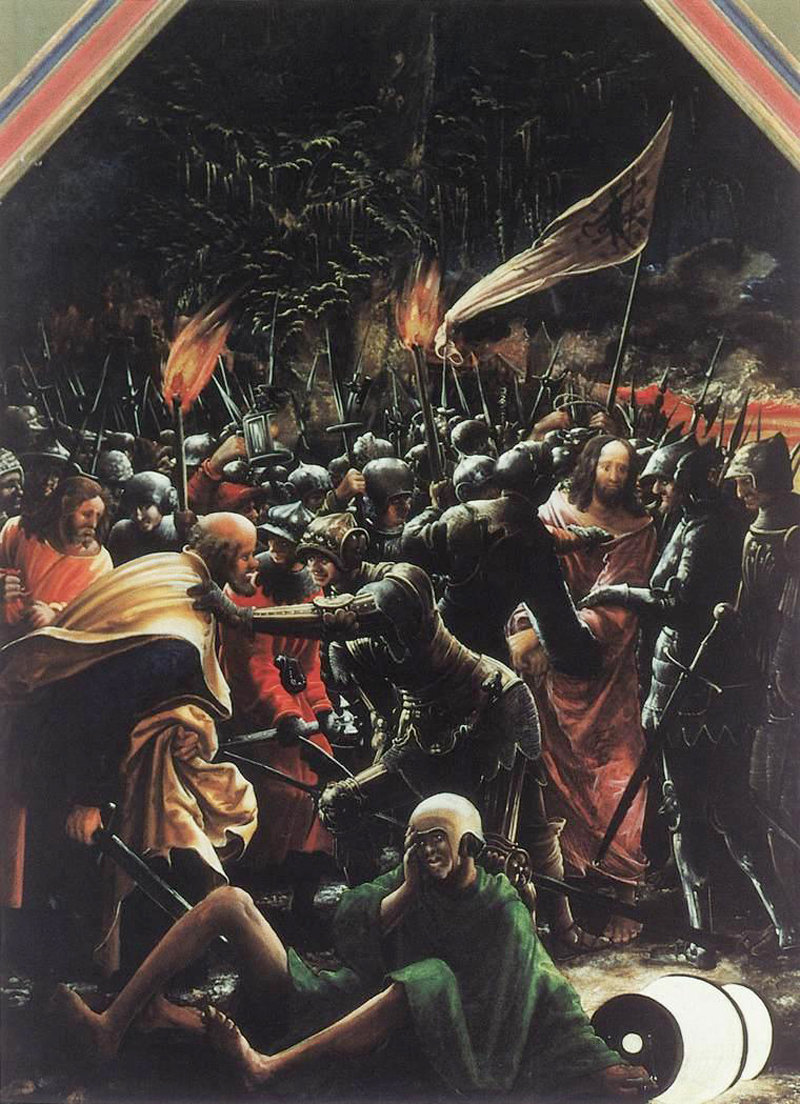
Arrest of Christ
Albrecht Altdorfer, 1520
My dear friends,
On this Good Friday, we gather here to reflect on a profound spiritual narrative from the Christian tradition, the story of Jesus' betrayal and arrest. This account is as deeply significant as it is enlightening, and it offers us valuable lessons that can benefit our own spiritual journey.
Our story begins in a quiet garden, where Jesus meets his destiny head-on. Jesus, a symbol of compassionate love, a great teacher, and according to Christian faith, an embodiment of divine essence, demonstrates a profound understanding of what is to unfold:
he went out with his disciples across the Kidron valley
to a place where there was a garden,
which he and his disciples entered.
Now Judas, who betrayed him, also knew the place,
because Jesus often met there with his disciples.
So Judas brought a detachment of soldiers
together with police from the chief priests
and the Pharisees, and they came there
with lanterns and torches and weapons.
Then Jesus, knowing all that was to happen to him,
came forward and asked them,
"Whom are you looking for?"
They answered, "Jesus of Nazareth."
Jesus replied, "I am he*."
Judas, who betrayed him, was standing with them.
When Jesus said to them, "I am he*,"
they stepped back and fell to the ground.
- John 18:1-6
In saying "I am," Jesus affirms his union with the divine identity identified in Exodus 3:14 as "I AM". The police, who in their Jewish faith tradition would recognize the implications of such a claim, fall back. It is a moment of confrontation with divine reality, a manifestation of divine power that leaves them in awe.
Jesus then proceeds to manifest two Buddhist paramitas, or "perfections".
And they said, "Jesus of Nazareth."
Jesus answered, "I told you that I am he*.
So if you are looking for me, let these men go."
This was to fulfill the word that he had spoken,
"I did not lose a single one of those whom you gave me."
- John 18:7-9
Here, Jesus embodies the perfection of generosity (dana) - specifically, the generosity of protection from fear (the other two main types of dana are the generosity of necessary things and the generosity of the spiritual path). Knowing he is the one the soldiers seek, he directs their attention away from his disciples, thereby ensuring their safety. This act of selflessness mirrors the Bodhisattva vow to protect others, even at great personal risk.
The slave's name was Malchus.
Jesus said to Peter, "Put your sword back into its sheath.
Am I not to drink the cup that the Father has given me?"
So the soldiers, their officer, and the Jewish police arrested Jesus and bound him.
- John 18:10-12
In verses 10-11, Jesus personifies the perfection of patience. When Peter impulsively draws his sword to protect him, Jesus gently admonishes him and accepts his impending suffering without resistance. His acceptance of the "cup" he must drink reflects an extraordinary degree of patience, one that perceives the profound interconnectedness of all events and accepts them without resentment or agitation.
The lessons for us are manifold. Firstly, like Jesus who affirmed "I am," we must continually strive to recognize and affirm the intrinsic Buddha-nature of ourselves and others, the primordial purity and potential for enlightenment inherent in all of us, which, alas, so often goes unrealized. This realization cultivates a profound sense of unity and compassion for all sentient beings.
Secondly, Jesus' act of protection for his disciples teaches us the importance of the paramita of generosity, of offering help and protection to others, even in the face of danger. Let this inspire us to act with kindness and selflessness in our lives, to safeguard the welfare of others above our own.
Lastly, Jesus' acceptance of his fate without anger or fear is a powerful demonstration of the paramita of patience. Contemplating the example of Jesus, we are reminded to cultivate a mind that is undisturbed by the ups and downs of life, that is able to embrace reality as it is, without resistance or aggression.
Let us meditate on these profound teachings, integrating them into our own lives, transforming our hearts and minds in the process. As we reflect on this Good Friday, may the light of Jesus' wisdom guide us towards understanding, compassion, and spiritual growth.